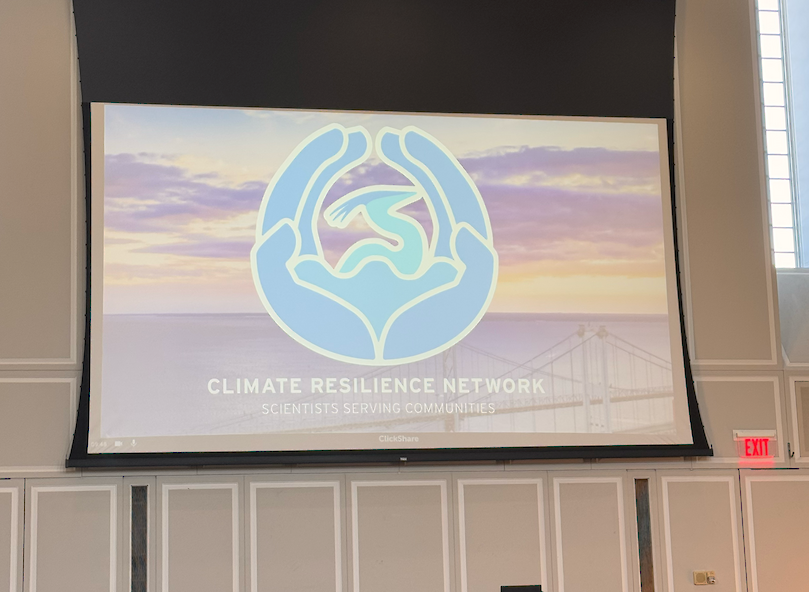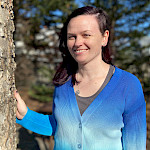Climbing Down the Ivory Tower
Annie Carew, Lili Badri ·The Climate Resilience Network held its second annual Scientists Serving Communities workshop from January 8–9, 2025 on the University of Maryland College Park campus. The workshop aimed to bring together UMD researchers with expertise in climate adaptation and resilience and connect them with regional stakeholders and community members who will use the information to strengthen their communities. The workshop’s partners included UMCES Integration and Application Network, Charles County Resilience Authority, and Southern Maryland Resource Conservation and Development.
The title of the workshop accurately describes its purpose. Climate resilience research directly serves communities, protecting them from current changes and preparing them for future changes. Dr. Jennifer Rice King, UMD’s Senior Vice President and Provost, expressed this purpose in her opening remarks. She spoke about the idea of grand challenges that face society, including climate change, and the criticality of interdisciplinary and transdisciplinary research to address such challenges. This approach to science actively deconstructs the “ivory tower syndrome” that is often present in academia. Ivory tower syndrome describes research that is somewhat disconnected from the wider world and not concerned with practical matters. The Scientists Serving Communities website outlines its role in “applying the science completed at universities to information packaged for decision making.” This idea perfectly encapsulates the IAN approach. Our goal is to synthesize complex science and communicate it for broader use—and engage communities at every step.

The unique format of the workshop emphasized its purpose. Every session was a panel-led discussion, and audience participation was a given. Since the audience included practitioners, as well as academic scientists, this discussion-based approach, guaranteed that participants would forge the connections that are vital to their work. The panelists provided details about the status of research on climate resilience indicators and resources on where to find the latest information. Attendees shared anecdotes and resources, asked and answered questions, and directed the flow of the conversation. Session topics included tidal flooding, air quality, insurance programs, and long-term climate prediction. The variety of topics highlights the interdisciplinary nature of climate research. Developing resilience to climate-related changes must include ecological, social, and economic considerations.
At IAN, we pride ourselves on incorporating social and economic data into our report cards, and such data was essential to the development of our 2021 Maryland Coastal Adaptation Report Card and our upcoming Charles County Adaptation Report Card. Human communities interact with and depend upon environmental health, and it is critical to examine both sides of the system to paint a full picture of what’s going on. For example, increased flooding can be linked to climate change (environment) and increases the need for flood insurance (economy) or migration out of coastal communities (social).
Interdisciplinary work depends on connecting with community members and listening to their concerns. In this way, rigorous scientific research can serve the communities most impacted by climate change and other environmental concerns. Workshops like Scientists Serving Communities demonstrate scientists’ commitment to a future in which science informs decisions that will benefit everyone.
About the authors
Annie Carew

Annie Carew graduated from UMCES with a Master's degree in 2019. Her thesis research examined the effects of genetic identity on aquatic plant restoration success. Annie's research interests include coastal management and climate adaptation. At IAN she works on workshop facilitation, data visualization, document design, data analysis, and social media management. She is an enthuiastic birder and botanist, and can often be found wandering in the woods on the weekends.
Lili Badri

Lili is a Senior Science Communicator at the University of Maryland Center for Environmental Science’s Integration and Application Network (IAN). Her work at IAN focuses on the synthesis and dissemination of scientific information through data analysis, visualization, and stakeholder engagement. She collaborates within and across disciplines to develop accessible communication products that support evidence-based decision-making. Her professional interests include enhancing science communication practices and understanding community perspectives to support sustainable and informed environmental solutions. She earned a Master's degree in Environmental Science at SUNY ESF and a Bachelor's degree in Chemistry at the University of South Alabama. Her previous research focused broadly on lab and field analysis of dissolved organic matter characterization and dynamics. Her personal interests include gardening, reading, and cooking.

